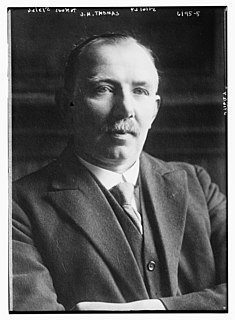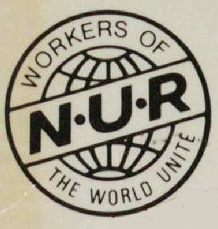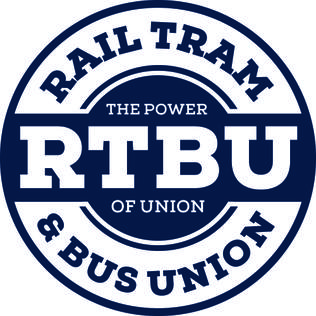Related Research Articles
In British politics, an affiliated trade union is one that is linked to the Labour Party. The party was created by the trade unions and socialist societies in 1900 as the Labour Representation Committee and the unions have retained close institutional links with it.

The Associated Society of Locomotive Engineers and Firemen (ASLEF) is a British trade union representing train drivers. It is part of the International Transport Workers' Federation and the European Transport Workers' Federation. At the end of 2018 ASLEF had 22,424 members. Its current General Secretary is Mick Whelan.

James Henry Thomas, sometimes known as Jimmy Thomas, was a Welsh trade unionist and Labour politician. He was involved in a political scandal involving budget leaks.

The National Union of Railwaymen was a trade union of railway workers in the United Kingdom. The largest railway workers' union in the country, it was influential in the national trade union movement.

The Modern Records Centre (MRC) is the specialist archive service of the University of Warwick in Coventry, England, located adjacent to the Central Campus Library. It was established in October 1973 and holds the world's largest archive collection on British industrial relations, as well as archives relating to many other aspects of British social, political and economic history.
James Knapp was a British trades unionist. He was successively General Secretary of the National Union of Railwaymen (NUR) from 1983, and then of the merged National Union of Rail, Maritime and Transport Workers (RMT) from 1990 to his death in 2001. He served on the executive board of the International Transport Workers' Federation from 1983 to 2001, the General Council of the Trades Union Congress from 1983 to 2001, and was President of the Trades Union Congress in 1994.

The Amalgamated Society of Railway Servants (ASRS) was a trade union of railway workers in the United Kingdom from 1872 until 1913.
Sidney Weighell was a British footballer, trade unionist and the General Secretary of the National Union of Railwaymen from 1975 to 1983.

Albert E. Fox was a UK trade unionist and Labour Representation Committee politician.

Concemore Thomas Thwaites Cramp, known as Charlie Cramp, was a British trade unionist and political activist.
National Railway strike of 1911 was the first national strike of railway workers in Britain. It arose from longstanding disputes between workers and railway companies, combined with the desire of the unions to assert their unity and strength. The strike lasted only two days, but the show of strength succeeded in forcing the Liberal Government to set up a Royal Commission to examine the workings of the 1907 Conciliation Board. The strike also led to the Llanelli Riots of 1911, in which six people died in clashes between railway workers and troops, which had been sent in to stop the blockade of the line by strikers.

The Rail, Tram and Bus Union Victorian branch or RTBU Victoria is the state branch of the RTBU in Victoria. Originally formed in 1993 as the Victorian branch of the Public Transport Union and renamed the RTBU in 1998, the RTBU Victoria today represents nearly 8000 members across Rail Operations, Tramways, Locomotive, Infrastructure and Administrative areas of Victoria's public transport industry.
The General Council of the Trades Union Congress is an elected body which is responsible for carrying out the policies agreed at the annual British Trade Union Congresses (TUC).

John Marchbank was a Scottish trade unionist.
James Campbell was a Scottish trade union leader.

James Edwin Williams was a British trade unionist.
William John Richard Squance was a Welsh trade unionist.

The General Railway Workers' Union was a trade union representing low-paid workers on the railways of the United Kingdom.
The National Union of Rail Workers of Australia (NUR) was an Australian trade union representing railway industry workers which operated from 1938 until 1993.
William James Abraham was a British trade unionist and politician who served as president of the National Union of Railwaymen (NUR).